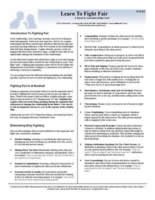All Couples Should Learn To FIght Fair. Here's How
Check out our mini-guide on how to fight fair, and stop letting badly handled conflict cause pain in your relationships. Download it NOW!
Don't be baited and manipulated into conflicts and arguments. Don't take the bait.
On The Line
Dealing With Hostile "Bait" by Robert Bacal
When dealing with verbal abuse or hostility from clients, it is important to be able to avoid responding to the "bait" that is placed before you. Not only is that important, but it is also important to know exactly what you can say, when you are subject to attacks like:
"If you really cared about my welfare, you would give me my check!"
"You guys in government are lazy and over-paid."
"I bet if I wasn't [ethnic group], you would give me...."
In this On The Line, we will help you deal with these kinds of remarks.
Some Background
In order to deal with these kinds of attacks there are a few things that you need to understand.
Verbal attacks follow certain patterns, and have some hidden rules. The attacker expects you to react in particular ways. Usually a verbal attacker will expect that you will become either defensive and intimidated, or that you will become aggressive and attack back. Unfortunately, when you do what the attacker suggests, you give control to him or her, and increase the probability that the attack will continue. So, the best way to stop an attack is not to take either of these actions.
In addition, verbal attacks tend to "run off" by themselves, in an almost automatic manner. So long as you do what is expected, the attacker is able to continue. So, you need to do something unexpected to stop the attack.
Also, verbal attacks contain bait. Just like the fisherman, the attacker presents you with bait in the hope that you will swallow it and be hooked. Bait is often unsaid, or pre-supposed. What this means is that the attacker need not attack you directly, but need only imply certain things, without really saying anything. Let's take an example.
In the attack sentence "If I wasn't [ethnic group], I bet you would give me....". If you look carefully, you won't find the insult in the words. Still, most people will react to the hidden bait...the implied suggestion of racism. It is important to be able to identify the hidden attack, so you can understand, and resist the attacker's effort to manipulate you.
Self-Defense Tactics
Dealing with these kinds of attacks can be complex, but we can suggest a few options that are likely to disrupt the attack.
1. The Disrupting Question
The general principle underlying this technique is that you want to do something somewhat unexpected, while at the same time, acknowledging the implied insult. It is important not to defend and not to be too passive.
The disrupting question follows the following form:
When did you start thinking that....?
where the end of the question relates to the unspoken insult or attack. For example, faced with the attack implying racism, disrupting questions might be:
When did you start thinking that we allow your ethnic background to influence our behaviour?
When did you start thinking that I am discriminating against you?
Both of these questions are likely to cause the attacker to become a bit confused and have to stop the attack so that he or she can figure out what to say next. This kind of response brings control back to you. In addition, these questions acknowledge, and respond to the issue brought up by the customer in a polite way.
2. Computer Mode
An attacker will often expect you to respond using an "I" statement (eg. I'm not racist), or a "You" statement (eg. "You can't talk to me that way").
You have a third option, that involves doing the unexpected. This option involves using what we call "computer mode" because it is somewhat detached, and removes the personalization from the attack. It does not involve I or You statements.
Some forms to remember include:
"It's interesting that some people think that [their ethnic background affects the way they are treated]."
"A good many people think that [government employees are over-paid]"
Note again that these responses will be unexpected by the attacker, and while they show that you heard the attack, they do not imply that you agree, or that your are defending or attacking.
Conclusion:
We have described two simple verbal responses to verbal attacks that tend to interrupt the attack cycle. Of course, there are other techniques that can be used, and it is important to realize that any attack defusing techniques must be applied with care and good judgement, since every situation is different. These techniques, coupled with others, can result in increasing your ability to deal with the hostile bait.
 Manage Conflict - Resolve Conflict - Prevent Conflict
Manage Conflict - Resolve Conflict - Prevent Conflict 

